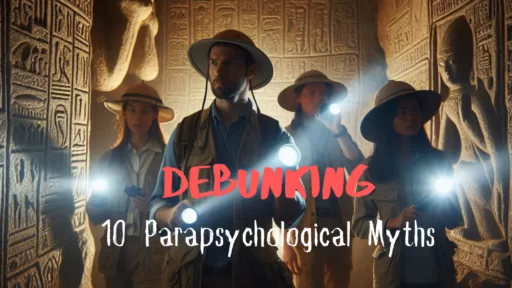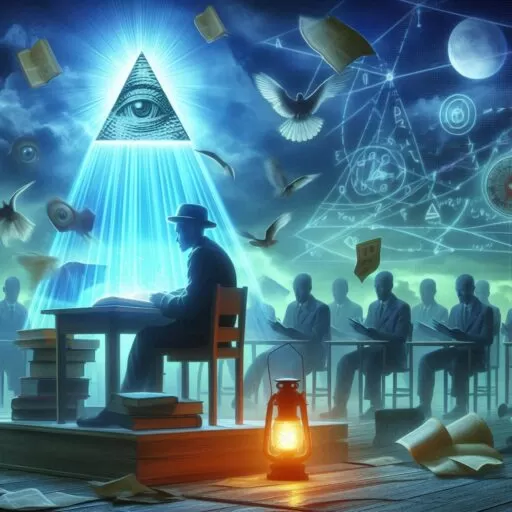
Have you ever been intrigued by the idea of psychic powers or paranormal phenomena? Despite the growing interest in parapsychology, there are numerous myths and misconceptions that surround this field of study.
In this blog post, we will debunk 10 common parapsychological myths and separate fact from fiction. Join us as we explore the scientific evidence, research methods, and controversies surrounding psychic abilities and paranormal phenomena.
Unveiling the Truth Behind Psychic Powers
When it comes to psychic powers, there is often a blurry line between reality and fiction. While many may associate psychic abilities with fortune-telling and mind-reading, the truth is more complex than meets the eye.
Understanding the Difference Between Genuine Psychic Abilities and Staged Performances
One of the biggest misconceptions about psychic powers is the belief that all psychics are frauds. While there have been instances of staged performances and deceit, there are also genuine individuals who possess psychic abilities. Distinguishing between the two requires a critical eye and an open mind.
Discussing the Scientific Studies That Support the Existence of Psychic Powers
Contrary to popular belief, there is a body of scientific research that supports the existence of psychic powers. Studies in parapsychology have explored phenomena such as telepathy, precognition, and psychokinesis, providing evidence that there may be more to the human mind than meets the eye.
While these findings are often met with skepticism, they continue to push the boundaries of what we know about the mind and consciousness.
Exploring the Science of Parapsychology
Parapsychology, often dismissed as pseudoscience, is actually a legitimate field of study that investigates paranormal phenomena. Despite its controversial nature, parapsychologists adhere to rigorous research methods to explore psychic abilities and other supernatural occurrences.
Rigorous Research Methods
Parapsychologists employ a range of scientific methods to investigate phenomena such as telepathy, clairvoyance, and psychokinesis. These include controlled experiments, statistical analysis, and peer review processes to ensure the validity and reliability of their findings.
Consciousness and Energy in Parapsychological Phenomena
One of the key areas of interest in parapsychology is the role of consciousness and energy in paranormal experiences. Researchers seek to understand how these factors may influence psychic abilities and other unexplained phenomena, shedding light on the mysteries of the human mind and its potential.
Dispelling Misconceptions about Parapsychological Myths
Parapsychology, the study of paranormal phenomena such as telepathy, clairvoyance, and psychokinesis, often faces skepticism and misconceptions. One common misconception is that parapsychological research is not scientific or rigorous. In reality, parapsychologists adhere to strict research protocols and methodologies to ensure the credibility of their findings.
Another misconception is that all paranormal phenomena can be easily explained away as fraud or trickery. While there have been cases of fraudulent psychics and mediums, there are also numerous documented instances of unexplainable psychic experiences that defy conventional explanations.
It is important to distinguish between genuine parapsychological research and pseudoscience. Peer-reviewed studies conducted by reputable researchers in the field provide valuable insights into the nature of psychic phenomena and challenge preconceived notions about the limits of human abilities.
By debunking these misconceptions and promoting critical thinking about parapsychology, we can foster a better understanding of the mysteries surrounding psychic powers and other unexplained phenomena.
Separating Fact from Fiction in 10 Common Myths
Parapsychology is a field that often generates a lot of misinformation and misconceptions. Let’s take a closer look at some of the most common myths about psychic powers and paranormal phenomena, and uncover the truth behind them:
- Myth 1: Psychics can predict the future with 100% accuracy. While psychics may have intuitive abilities that can provide insights into potential outcomes, it is important to remember that the future is not set in stone and can be influenced by a multitude of factors. Therefore, it is not realistic to expect psychics to predict the future with 100% accuracy.
- Myth 2: People with psychic abilities can read minds. While some individuals may claim to have the ability to read minds, there is no scientific evidence to support this claim. In reality, it is more likely that these individuals are skilled at picking up on subtle cues and body language to make educated guesses about what someone may be thinking or feeling. It is important to approach claims of mind-reading abilities with skepticism and critical thinking.
- Myth 3: Paranormal experiences are always supernatural and unexplainable. While some paranormal experiences may seem supernatural and unexplainable at first glance, there are often logical explanations for these occurrences. It is important to approach these experiences with an open mind and investigate all possible explanations before jumping to supernatural conclusions. In many cases, what may initially appear to be paranormal can be attributed to natural phenomena, psychological factors, or simply a lack of understanding of the situation. It is essential to keep an objective perspective and consider all possibilities when encountering paranormal experiences.
- Myth 4: Only certain people possess psychic powers, while others don’t. This myth is false. Psychic abilities are believed to be present in everyone to some degree, but some individuals may be more naturally attuned to them or have practiced and developed them more than others. With dedication and practice, anyone can potentially tap into their psychic abilities and strengthen their intuition.
- Myth 5: Parapsychology is not a legitimate scientific field. This myth is based on misconceptions and misunderstandings about the field of parapsychology. In reality, parapsychology is a legitimate scientific field that studies phenomena such as telepathy, clairvoyance, psychokinesis, and near-death experiences using scientific methods and rigorous research protocols. Researchers in parapsychology adhere to the same principles of scientific inquiry as any other field of study, including the use of experimental designs, statistical analysis, and peer review. While the nature of the phenomena studied in parapsychology may be unconventional, the methods used to study them are firmly grounded in scientific principles.
- Myth 6: Psychic powers defy the laws of physics and cannot be explained scientifically. This myth is not entirely accurate. While psychic powers may not fit neatly into our current understanding of physics, that does not mean they cannot be studied scientifically. In fact, there are researchers who are actively studying psychic phenomena and attempting to explain them through scientific methods. By exploring these abilities through rigorous experimentation and analysis, we may eventually be able to understand the underlying mechanisms behind psychic powers.
- Myth 7: Parapsychological research is conducted by pseudoscientists and charlatans. This myth is not true. Parapsychological research is conducted by legitimate scientists who follow the same rigorous methods and standards as any other branch of science. Research in parapsychology is peer-reviewed and published in reputable scientific journals. Scientists in this field are dedicated to studying phenomena such as telepathy, clairvoyance, and psychokinesis in a systematic and objective manner. It is important to approach all scientific research with an open mind and evaluate the evidence based on the quality of the research methods and results.
- Myth 8: Belief in paranormal phenomena is a sign of gullibility or mental instability. This myth suggests that those who believe in paranormal phenomena are easily deceived or are not mentally sound. However, many people who believe in the paranormal do so based on personal experiences, research, and evidence that they find compelling. It is important to approach these beliefs with an open mind and respect for individual perspectives.
- Myth 9: Skeptics who debunk paranormal claims are closed-minded and biased. This is a common misconception about skeptics who debunk paranormal claims. In reality, skeptics approach these claims with a critical and evidence-based mindset, seeking to uncover the truth behind the purported phenomena. Their goal is not to dismiss all claims outright, but rather to investigate them thoroughly and separate fact from fiction. This dedication to rational inquiry is what sets skeptics apart from those who may be closed-minded or biased in their beliefs.
- Myth 10: All reported paranormal experiences are evidence of psychic powers. While some paranormal experiences may indeed be attributed to psychic abilities, not all reported experiences can be definitively linked to such powers. It is important to consider other possible explanations, such as psychological factors, environmental influences, or even simple misunderstandings. It is essential to approach each reported paranormal experience with a critical and open-minded perspective in order to truly understand the underlying causes.
By examining these myths through a scientific lens and understanding the research behind parapsychology, we can separate fact from fiction and gain a clearer perspective on the reality of psychic phenomena.
Unmasking the Reality of Parapsychology
When it comes to parapsychology, there is often a lot of misinformation and misunderstanding surrounding the field. Many people have preconceived notions about what parapsychologists do and the validity of their research. In reality, parapsychology is a scientific discipline that aims to study paranormal phenomena using rigorous research methods.
One of the main goals of parapsychology is to investigate the nature of consciousness and its potential connection to psychic abilities. Researchers in this field conduct experiments to explore the possibility of extrasensory perception (ESP), telepathy, and psychokinesis.
It is important to note that parapsychology is not about proving the existence of supernatural powers or confirming superstitions. Instead, it seeks to understand and explain anomalous experiences using empirical evidence.
Moreover, ethical considerations play a significant role in parapsychological research. Researchers are dedicated to upholding ethical standards and ensuring the well-being of participants involved in experiments related to paranormal phenomena.
By unmasking the reality of parapsychology, we can dispel misconceptions and highlight the scientific rigor that underpins this fascinating field of study.
Debunking Popular Beliefs About Parapsychological Phenomena

One of the most common misconceptions about parapsychology is the belief that psychics can predict the future with certainty. In reality, psychic abilities are often more nuanced and complex than simply foreseeing events before they happen.
Another popular belief is that paranormal entities like ghosts can communicate with the living through mediums. While there are reported instances of mediumship, the scientific community remains skeptical of the validity of such communications.
Many people also believe that individuals with psychic powers can manipulate objects with their minds, a phenomenon known as telekinesis. However, research in parapsychology has yet to provide concrete evidence of such abilities.
It’s important to approach these beliefs with a critical eye and consider the scientific evidence that supports or refutes them. By separating fact from fiction, we can gain a better understanding of the complex world of parapsychological phenomena.
Navigating the Controversies Surrounding Parapsychology
Parapsychology, the study of paranormal phenomena, often finds itself at the center of controversy within the scientific community. Skepticism and criticism from mainstream science have plagued parapsychology for years, with many dismissing it as pseudoscience. Despite this, researchers in the field are dedicated to conducting rigorous studies and experiments to explore the unexplained.
Skepticism and Criticism
One of the main criticisms of parapsychology is the lack of reproducibility in experiments and the perceived reliance on anecdotal evidence. Skeptics argue that the results of studies claiming to show psychic abilities or other paranormal phenomena are often not statistically significant or cannot be replicated by independent researchers.
Cultural Beliefs and Superstitions
Additionally, cultural beliefs and superstitions can play a significant role in shaping attitudes towards parapsychology. In some cultures, beliefs in psychic powers or supernatural abilities are deeply ingrained and may influence the acceptance or rejection of parapsychological research.
Impact on Acceptance
Despite the challenges and controversies faced by parapsychology, researchers continue to push the boundaries of scientific knowledge in exploring the mysteries of the mind and consciousness. By engaging in thoughtful debate and conducting methodologically sound studies, parapsychologists aim to bridge the gap between the scientific community and the unexplained realms of psychic phenomena.
Conclusion
In debunking 10 common parapsychological myths, it becomes evident that separating fact from fiction in this field is crucial. By understanding the science behind parapsychology and differentiating between genuine psychic abilities and staged performances, we can gain a clearer perspective on the validity of paranormal phenomena.
It is essential to rely on rigorous research methods and peer-reviewed studies to challenge misconceptions and debunk myths surrounding psychic powers. As we navigate the controversies and skepticism surrounding parapsychology, it is important to approach these phenomena with an open mind, allowing scientific evidence to guide our understanding.
By unmasking the reality of parapsychology and addressing popular beliefs with evidence-based explanations, we can move towards a more informed and critical examination of paranormal activities.

Comments are closed, but trackbacks and pingbacks are open.